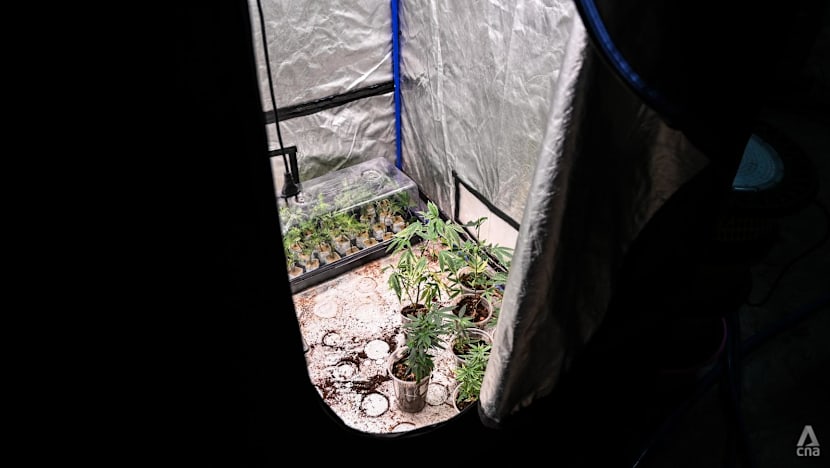Health
New Cannabis Regulations in Thailand Spark Black Market Surge

Thailand’s recent shift in cannabis regulations has led to a significant crisis in the market, with many businesses reporting a staggering drop in sales. Since the laws changed on June 25, 2023, requiring cannabis to be sold exclusively for medical purposes, the nation’s approximately 18,000 licensed stores have experienced sales declines of up to 90 percent. The new rules, announced by the Ministry of Public Health, have caused confusion among customers and left small business owners struggling to adhere to the new requirements.
Although cannabis remains legal in Thailand, stringent regulations have been imposed on both buyers and sellers. Customers are now required to present valid prescriptions from doctors, which must be documented along with personal information such as name, age, nationality, and diagnosis. Violations of these regulations can result in severe penalties, including a maximum one-year jail sentence and a fine of 20,000 baht (US$618), along with the potential revocation of business licenses. Additional constraints limit individual purchases to 30 grams, considered a month’s supply.
In response to the backlash, the ministry has attempted to clarify the new rules. A recent announcement included measures such as registering businesses in a central database, allowing telemedicine access for new patients, and providing training for staff to enhance industry professionalism. Despite these efforts, critics argue that the regulations are impractical and politically motivated, claiming they have stifled a burgeoning industry.
Public Health Minister Somsak Thepsuthin has defended the changes, stating they are necessary to regulate an industry that has expanded without sufficient oversight. “We want to tell tourists they are welcome to enjoy Thailand’s culture and nature — but Thailand should not be seen as a destination for recreational cannabis use,” he told CNN. The minister asserted that while revenue may dip initially, prioritizing medical regulation is key to mitigating potential social harms from unregulated cannabis use.
The black market for cannabis has surged as businesses struggle to comply with the new rules. Rattapon Sanrak, founder of Highland Cafe and a prominent figure in the cannabis industry, reported that sales have plummeted by as much as 90 percent since the announcement of the new regulations. “People panicked and were not comfortable coming to the shop to buy it,” he explained. Warittha, co-owner of Bangkok Exotics Dispensary, shared a similar sentiment, stating that many customers are deterred by the new requirements, leading her to close one of her branches in Krabi.
The fear of registration has pushed many consumers towards illegal channels. Warittha noted that her clientele, composed primarily of high-earning professionals, are reluctant to register as prescribed users due to the stigma attached to cannabis use in Thai society. She revealed that many dispensaries are resorting to circumventing legal procedures, often applying for medical prescriptions on behalf of customers who have not seen a doctor.
The price differential between legal and black-market cannabis further exacerbates the issue. A user known as “Book” explained that while legal dispensaries charge around 300 baht per gram, underground suppliers offer prices as low as 50 to 80 baht, making illegal purchases more appealing. Anawat, an underground grower, has abandoned attempts to formalize his business, stating, “You cannot make money above ground.”
Advocates for stricter regulation support the government’s approach, arguing that cannabis stores should operate within the legal framework to ensure product quality and consumer safety. Tom Kruesopon, a former proponent of cannabis decriminalization, now argues for tighter controls, stating that unregulated sales pose serious risks to public health. “Would you not want to ensure that the people who are taking cannabis are getting quality products rather than products that are tainted?” he questioned.
The political landscape surrounding cannabis regulation in Thailand is fraught with division. The ruling Pheu Thai party has expressed intentions to revert cannabis to its previous status on the narcotics list, while the Bhumjaithai Party, which has strong ties to the cannabis industry, advocates for a more lenient approach. Kitty Chopaka, a cannabis rights activist, highlighted the chaotic nature of the current policy, stating that the situation is driven more by political maneuvering than logical governance.
As businesses continue to grapple with the implications of the new regulations, many are seeking more stable and predictable policies. Rattapon is currently considering a class-action lawsuit on behalf of hundreds of plaintiffs who are affected by the abrupt shifts in cannabis policy. The uncertainty surrounding potential criminal liabilities if cannabis were to be re-criminalized looms large, leaving many in the industry anxious about the future.
In the coming weeks, discussions surrounding the appointment of a new prime minister may further influence the regulatory landscape for cannabis in Thailand. As the industry awaits clarity, stakeholders remain hopeful for a resolution that balances necessary regulation with the viability of legal cannabis businesses in the nation.
-

 Business5 months ago
Business5 months agoKenvue Dismisses CEO Thibaut Mongon as Strategic Review Advances
-

 Lifestyle4 months ago
Lifestyle4 months agoHumanism Camp Engages 250 Youths in Summer Fest 2025
-

 Sports4 months ago
Sports4 months agoDe Minaur Triumphs at Washington Open After Thrilling Comeback
-

 Sports5 months ago
Sports5 months agoTupou and Daugunu Join First Nations Squad for Lions Clash
-

 Top Stories5 months ago
Top Stories5 months agoColombian Senator Miguel Uribe Shows Signs of Recovery After Attack
-

 World5 months ago
World5 months agoASEAN Gears Up for Historic Joint Meeting of Foreign and Economic Ministers
-

 Health4 months ago
Health4 months agoNew Study Challenges Assumptions About Aging and Inflammation
-

 Business5 months ago
Business5 months agoOil Prices Surge Following New EU Sanctions on Russia
-

 Entertainment4 months ago
Entertainment4 months agoDetaşe-Sabah Violin Ensemble Captivates at Gabala Music Festival
-

 Entertainment4 months ago
Entertainment4 months agoBaku Metro Extends Hours for Justin Timberlake Concert
-

 Top Stories5 months ago
Top Stories5 months agoRethinking Singapore’s F&B Regulations Amid Business Closures
-

 Business5 months ago
Business5 months agoU.S. House Approves Stablecoin Bill, Sends to Trump for Signature









